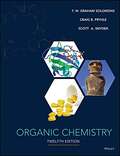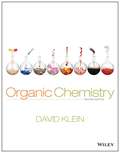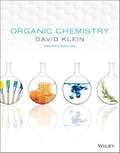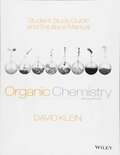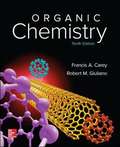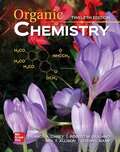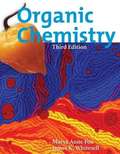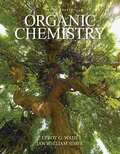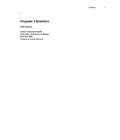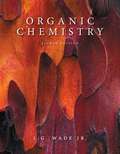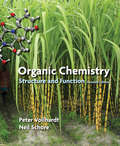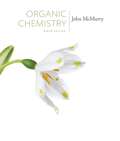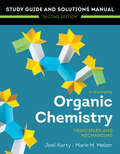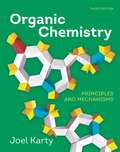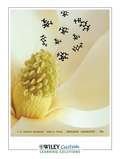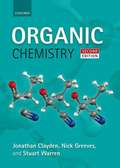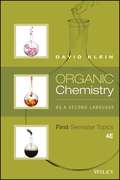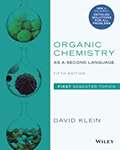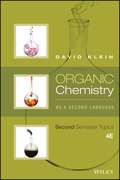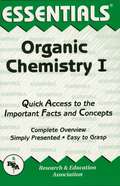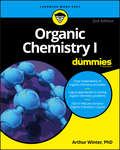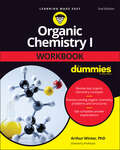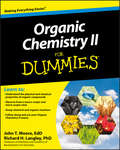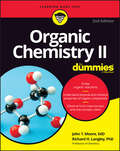- Table View
- List View
Organic Chemistry
by T. W. Graham Solomons Craig B. Fryhle Scott A. SnyderThe 12th edition of Organic Chemistry continues Solomons, Fryhle & Snyder's tradition of excellence in teaching and preparing students for success in the organic classroom and beyond. A central theme of the authors' approach to organic chemistry is to emphasize the relationship between structure and reactivity. To accomplish this, the content is organized in a way that combines the most useful features of a functional group approach with one largely based on reaction mechanisms. The authors' philosophy is to emphasize mechanisms and their common aspects as often as possible, and at the same time, use the unifying features of functional groups as the basis for most chapters. The structural aspects of the authors' approach show students what organic chemistry is. Mechanistic aspects of their approach show students how it works. And wherever an opportunity arises, the authors' show students what it does in living systems and the physical world around us.
Organic Chemistry
by David KleinThe textbook includes important concepts in Organic chemistry, complete with conceptual checkpoints that promote mastery of the concepts, and special emphasis is placed on skills development through Skill Builders to support these concepts.
Organic Chemistry
by David KleinOrganic Chemistry, 4th Edition provides a comprehensive yet accessible treatment of all the essential organic chemistry concepts covered in a two-semester course. Presenting a skills-based approach that bridges the gap between organic chemistry theory and real-world practice, Dr. David Klein makes content comprehensible to students while placing special emphasis on developing their problem-solving skills through applied exercises and activities. This edition is available with the new and improved WileyPLUS--an immersive online environment packed with interactive study tools, strategies, and resources that support different learning styles.
Organic Chemistry
by David R. KleinOrganic Chemistry, 2nd Edition is not merely a compilation of principles, but rather, it is a disciplined method of thought and analysis. Success in organic chemistry requires mastery in two core aspects: fundamental concepts and the skills needed to apply those concepts and solve problems. Readers must learn to become proficient at approaching new situations methodically, based on a repertoire of skills. These skills are vital for successful problem solving in organic chemistry. Existing textbooks provide extensive coverage of, the principles, but there is far less emphasis on the skills needed to actually solve problems.
Organic Chemistry
by Francis A. Carey Robert M. GiulianoOrganic Chemistry has been designed to meet the needs of the "mainstream," two-semester, undergraduate organic chemistry course. This best-selling text gives students a solid understanding of organic chemistry by stressing how fundamental reaction mechanisms function and reactions occur.
Organic Chemistry
by Francis A. Carey Robert M. Giuliano Neil Allison Susan BaneOrganic Chemistry has been designed to meet the needs of the two-semester, undergraduate organic chemistry course. This best-selling text gives students a solid understanding of organic chemistry by focusing on how fundamental reaction mechanisms function and reactions occur. The authors strive for students to have a deeper understanding of the physical concepts that underlie organic chemistry, and for them to have a broader knowledge of the role of organic chemistry in biological systems.
Organic Chemistry
by Marye Anne Fox James K. WhitesellOrganic Chemistry by Fox and Whitesell is the pioneer in the mechanistic approach. Now in its third volume, this classic and proven pedagogy provides a much better basis for students to retain a knowledge base and extend it to practical applications in other areas of science. The mechanistic approach groups chemical reactions according to how the sequence of changes occurs- their common mechanisms- rather than by functional groups (what category- alcohols, amines, alkenes, etc.). Where appropriate, the text subdivides information based on functional groups. The text covers ALL of basic organic chemistry in the first 14 chapters and reviews the reactions covered in these chapters in chapter 15 on multi-step synthesis. The text also contains extensive coverage of both industrial and biological polymers, and describes molecular basis for drug action.
Organic Chemistry
by Leroy Wade Jan SimekA Student-Centered Approach to Learning and Studying Organic Chemistry Wade & Simek’s Ninth edition of Organic Chemistry presents key principles of organic chemistry in the context of fundamental reasoning and problem solving. Authored to complement how students use a textbook today, new Problem Solving Strategies, Partially Solved Problems, Visual Reaction Guides and Reaction Starbursts encourage students to use the text before class as a primary introduction to organic chemistry as well as a comprehensive study tool for working problems and/or preparing for exams. With unparalleled and highly refined pedagogy, this Ninth edition gives students a contemporary overview of organic principles and the tools for organizing and understanding reaction mechanisms and synthetic organic chemistry.
Organic Chemistry
by Janice Gorzynski SmithSmith's Organic Chemistry continues to breathe new life into the organic chemistry world. This new fifth edition retains its popular delivery of organic chemistry content in a student-friendly format. Janice Smith draws on her extensive teaching background to deliver organic chemistry in a way in which students learn: with limited use of text paragraphs, and through concisely written bulleted lists and highly detailed, well-labeled “teaching” illustrations. The fifth edition features a modernized look with updated chemical structures throughout. Don’t make your text decision without seeing Organic Chemistry, 5th edition by Janice Gorzynski Smith!
Organic Chemistry
by L. G. WadeAcclaimed for its clarity and precision, Wade's Organic Chemistry maintains scientific rigor while engaging students at all levels. Wade presents a logical, systematic approach to understanding the principles of organic reactivity and the mechanisms of organic reactions. This approach helps students develop the problem-solving strategies and the scientific intuition they will apply throughout the course and in their future scientific work. The Eighth Edition provides enhanced and proven features in every chapter, including new Chapter Goals, Essential Problem-Solving Skills and Hints that encourage both majors and non-majors to think critically and avoid taking "short cuts" to solve problems. Mechanism Boxes and Key Mechanism Boxes strengthen student understanding of Organic Chemistry as a whole while contemporary applications reinforce the relevance of this science to the real world.
Organic Chemistry
by Peter Vollhardt Neil SchoreWith authors who are both accomplished researchers and educators, Vollhardt and Schore's Organic Chemistry takes a functional group approach with a heavy emphasis on understanding how the structure of a molecule determines how that molecule will function in chemical reactions. By understanding the connection between structure and function, students will be better prepared to understand mechanisms and solve practical problems in organic chemistry. The new edition brings in the latest research breakthroughs and applications, expanded problem-solving help, and new online homework options.
Organic Chemistry (Ninth Edition)
by John McmurryJohn McMurry makes learning of Organic Chemistry as enjoyable as he experienced while writing this book.
Organic Chemistry (Second Edition): Study Guide/solutions Manual
by Joel KartyUnderstand more, memorize less.
Organic Chemistry (Sixth Edition)
by Eric Anslyn William Henry Brown Brent L. Iverson Christopher S. FooteRenowned for its unified mechanistic themes, emphasis on biological examples, use of applied problems from the pharmaceutical field, and unrivaled full-color visuals, ORGANIC CHEMISTRY, Sixth Edition, delivers cutting-edge coverage packed with reader-friendly features. Offering a clear presentation, the book offsets reaction mechanisms in a stepwise fashion and emphasizes similarities between related mechanisms, using just four different characteristics: breaking a bond, making a new bond, adding a proton and taking a proton away.
Organic Chemistry (Third Edition): Principles And Mechanisms
by Joel KartyMotivate every student to think about, practice, and apply organic chemistry. Joel Karty helps students succeed in organic chemistry, and our adopters overwhelmingly agree that his mechanistically organized approach works. The Third Edition includes a new video series that models the critical thinking skills that students need to master. Redesigned, two-column Solved Problems then coach students in applying those critical thinking skills to solving chemical equations, which helps them avoid overreliance on memorization. Interactive features in the book and Smartwork consistently give students opportunities to practice what they’ve learned. This purchase offers access to the digital ebook only.
Organic Chemistry 10th Edition
by T. W. Graham Solomons Craig B. FryhleThe Tenth Edition of Organic Chemistry continues Solomons/Fryhle's tradition of excellence in teaching and preparing students for success in the organic classroom and beyond. A central theme of the authors' approach to organic chemistry is to emphasize the relationship between structure and reactivity. To accomplish this, the text is organized in a way that combines the most useful features of a functional group approach with one largely based on reaction mechanisms. The authors' philosophy is to emphasize mechanisms and their common aspects as often as possible, and at the same time to use the unifying features of functional groups as the basis for most chapters. The structural aspects of the authors' approach show students what organic chemistry is. Mechanistic aspects of their approach show students how it works. And wherever an opportunity arises, the authors' show students what it does in living systems and the physical world around us. In the 10th edition, virtually every aspect of the teaching and learning solution has been revisited and redesigned to assist students in comprehending the fundamentals of organic chemistry. The authors' thoroughly explain and illustrate each new idea when it is first introduced and then reinforce the new idea or concept by having students work related problems.
Organic Chemistry 2nd Edition
by Stuart Warren Jonathan Clayden Nick GreevesLike the first, the second edition is built on three principles: An explanatory approach, through which the reader is motivated to understand the subject and not just learn the facts; A mechanistic approach, giving the reader the power to understand compounds and reactions never previously encountered; An evidence-based approach, setting out clearly how and why reactions happen as they do, giving extra depth to the reader's understanding.
Organic Chemistry As A Second Language: First Semester Topics
by David R. KleinOrganic Chemistry may be challenging, but that doesn't mean you can't get the grade you want. With David Klein's Organic Chemistry as a Second Language: Translating the Basic Concepts, you'll be able to better understand fundamental principles, solve problems, and focus on what you need to know to succeed. <P><P> Here's how you can get a better grade in Organic Chemistry: <P><P> <P><P>Understand the Big Picture. Organic Chemistry as a Second Language points out the major principles in Organic Chemistry and explains why they are relevant to the rest of the course. By putting these principles together, you'll have a coherent framework that will help you better understand your textbook. <P><P> <P><P>Study More Efficiently and Effectively Organic Chemistry as a Second Language provides time-saving study tips and a clear roadmap for your studies that will help you to focus your efforts. <P><P> <P><P>Improve Your Problem-Solving Skills <P><P>Organic Chemistry as a Second Language will help you develop the skills you need to solve a variety of problem types-even unfamiliar ones!
Organic Chemistry As A Second Language: First Semester Topics
by David R. KleinOrganic chemistry can be a challenging subject. Most students view organic chemistry as a subject requiring hours upon hours of memorization. Author David Klein's Second Language books prove this is not true—organic chemistry is one continuous story that actually makes sense if you pay attention. Offering a unique skill-building approach, these market-leading books teach students how to ask the right questions to solve problems, study more efficiently to avoid wasting time, and learn to speak the language of organic chemistry. Covering the initial half of the course, Organic Chemistry as a Second Language: First Semester Topics reviews critical principles and explains their relevance to the rest of the course. Each section provides hands-on exercises and step-by-step explanations to help students fully comprehend classroom lectures and textbook content. Now in its fifth edition, this valuable study resource covers the characteristics of molecules, the nature of atomic bonds, the relationships between different types of molecules, drawing and naming molecules, and essential molecular reactions.
Organic Chemistry As A Second Language: Second Semester Topics
by David KleinReaders continue to turn to Klein's Organic Chemistry As a Second Language: Second Semester Topics, 4th Edition because it enables them to better understand fundamental principles, solve problems, and focus on what they need to know to succeed. The fourth edition explores the major principles in the field and explains why they are relevant. It is written in a way that clearly shows the patterns in organic chemistry so that readers can gain a deeper conceptual understanding of the material. Topics are presented clearly in an accessible writing style along with numerous hands-on problem solving exercises.
Organic Chemistry I Essentials
by The Editors of REA Adrian DingleREA's Essentials provide quick and easy access to critical information in a variety of different fields, ranging from the most basic to the most advanced. As its name implies, these concise, comprehensive study guides summarize the essentials of the field covered. Essentials are helpful when preparing for exams, doing homework and will remain a lasting reference source for students, teachers, and professionals. Organic Chemistry I includes structure and properties, alkanes, alkenes, alkynes, alkyl halides, stereochemistry, cyclic hydrocarbons, aromatic hydrocarbons, aryl halides, ethers and epoxides, alcohols and glycols, and carboxylic acids.
Organic Chemistry I For Dummies
by Arthur WinterThe easy way to take the confusion out of organic chemistryOrganic chemistry has a long-standing reputation as a difficult course. Organic Chemistry I For Dummies takes a simple approach to the topic, allowing you to grasp concepts at your own pace.This fun, easy-to-understand guide explains the basic principles of organic chemistry in simple terms, providing insight into the language of organic chemists, the major classes of compounds, and top trouble spots. You'll also get the nuts and bolts of tackling organic chemistry problems, from knowing where to start to spotting sneaky tricks that professors like to incorporate.Refreshed example equationsNew explanations and practical examples that reflect today's teaching methodsFully worked-out organic chemistry problemsBaffled by benzines? Confused by carboxylic acids? Here's the help you need--in plain English!
Organic Chemistry I Workbook For Dummies
by Arthur WinterNeed help with organic chemistry? Get extra practice with this workbook If you’re looking for a little extra help with organic chemistry than your Organic Chemistry I class offers, Organic Chemistry I Workbook For Dummies is exactly what you need! It lets you take the theories you’re learning (and maybe struggling with) in class and practice them in the same format you’ll find on class exams and other licensing exams, like the MCAT. It offers tips and tricks to memorize difficult concepts and shortcuts to solving problems. This reference guide and practice book explains the concepts of organic chemistry (such as functional groups, resonance, alkanes, and stereochemistry) in a concise, easy-to-understand format that helps you refine your skills. It also includes real practice with hundreds of exam questions to test your knowledge. Walk through the answers and clearly identify where you went wrong (or right) with each problem Get practical advice on acing your exams Use organic chemistry in practical applications Organic Chemistry I Workbook For Dummies provides you with opportunities to review the material and practice solving problems based on the topics covered in a typical Organic Chemistry I course. With the help of this practical reference, you can face down your exam and pass on to Organic Chemistry II with confidence!
Organic Chemistry II For Dummies
by John T. Moore Richard LangleyA plain-English guide to one of the toughest courses around So, you survived the first semester of Organic Chemistry (maybe even by the skin of your teeth) and now it's time to get back to the classroom and lab! Organic Chemistry II For Dummies is an easy-to-understand reference to this often challenging subject. Thanks to this book, you'll get friendly and comprehensible guidance on everything you can expect to encounter in your Organic Chemistry II course. An extension of the successful Organic Chemistry I For Dummies Covers topics in a straightforward and effective manner Explains concepts and terms in a fast and easy-to-understand way Whether you're confused by composites, baffled by biomolecules, or anything in between, Organic Chemistry II For Dummies gives you the help you need - in plain English!
Organic Chemistry II For Dummies
by John T. Moore Richard H. LangleyWith Dummies at your side, you can conquer O-chem Organic chemistry is, well, tough. With Organic Chemistry II For Dummies, you can (and will!) succeed at one of the most difficult college courses you’ll encounter. We make the subject less daunting in the second semester, with a helpful review of what you learned in Organic Chemistry I, clear descriptions of organic reactions, hints for working with synthesis and roadmaps, and beyond. You’ll love the straightforward, effective way we explain advanced O-chem material. This updated edition is packed with new practice problems, fresh examples, and updated exercises to help you learn quickly. Observe from a macroscopic and microscopic view, understand the properties of organic compounds, get an overview of carbonyl group basics, and everything else you’ll need to pass the class. Organic Chemistry II For Dummies is packed with tips to help you boost your exam scores, stay on track with assignments, and navigate advanced topics with confidence. Brush up on concepts from Organic Chemistry I Understand the properties of organic compounds Access exercises and practice questions to hone your knowledge Improve your grade in the second semester of Organic ChemistryOrganic Chemistry II For Dummies is for students who want a reference that explains concepts and terms more simply. It’s also a perfect refresher O-chem veterans preparing for the MCAT.
